|
|
|
Sort Order |
|
|
|
Items / Page
|
|
|
|
|
|
|
| Srl | Item |
| 1 |
ID:
015989
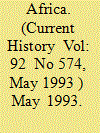

|
|
|
| 2 |
ID:
141877
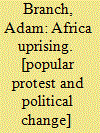

|
|
|
|
|
| Publication |
London, Zed Books, 2015.
|
| Description |
xi, 251p.hbk
|
| Contents |
(B)
|
| Standard Number |
9781780329987
|
|
|
|
|
|
|
|
|
|
|
|
Copies: C:1/I:0,R:0,Q:0
Circulation
| Accession# | Call# | Current Location | Status | Policy | Location |
| 058379 | 960/BRA 058379 | Main | On Shelf | General | |
|
|
|
|
| 3 |
ID:
072211
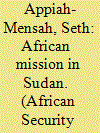

|
|
|
| 4 |
ID:
191041
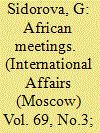

|
|
|
|
|
| Summary/Abstract |
THE myth of the indestructibile primacy of Western countries - former metropolises in world affairs, including on the African continent - is crumbling day by day, proving its groundlessness. The colossus's feet turned out to be clay, unable to stand the test of time. Today, the West is at a loss over Russia's practical steps to strengthen friendly relations with the states of Africa and the East in the name of international security and cooperation for the benefit of all peoples.1.
|
|
|
|
|
|
|
|
|
|
|
|
|
|
|
|
| 5 |
ID:
083083
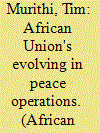

|
|
|
| 6 |
ID:
130221
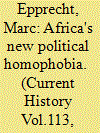

|
|
|
|
|
| Publication |
2014.
|
| Summary/Abstract |
Uganda has a population problem. The United Nations forecasts that the number of people living there will surpass the combined populations of Germany, Italy, and Japan by the end of this century-growing to 205 million in an area about the size of Oregon. It is hard to imagine how this will help with Uganda's
current poverty problem. The nation ranks 161st in the world in the UN's Human Development Index. Having deployed troops in Somalia and South Sudan and suffered terrorist attacks in the capital city, Kampala, Uganda also has a security problem. This partly explains the harassment and repression of the press and civil society groups by a government that is increasingly intolerant of any dissent.
|
|
|
|
|
|
|
|
|
|
|
|
|
|
|
|
| 7 |
ID:
160028
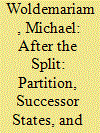

|
|
|
|
|
| Summary/Abstract |
Why do partitioned successor states engage one another in armed conflict? We explore the drivers of war between successor states by comparing two border crises that followed the partitions of Ethiopia (1993) and Sudan (2011). We argue that the politico-military struggles that give way to partition create important historical memories that shape what successor states think about the utility of military force. While the partition of Ethiopia yielded successor states led by regimes that were victors of the preceding war of partition, the war of partition in Sudan produced successor states that emerged out of military stalemate. This distinction explains why Ethiopia and Eritrea waged a costly border war that Sudan and South Sudan were able to avoid.
|
|
|
|
|
|
|
|
|
|
|
|
|
|
|
|
| 8 |
ID:
092173
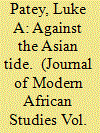

|
|
|
|
|
| Publication |
2009.
|
| Summary/Abstract |
The efforts of American activists to pressure Asian corporations in Sudan have to date resembled a struggle to find the light switch in the dark, or swimming against a strong current. While the impact of the divestment campaign in the United States has been increasingly evident, its effectiveness in producing actual results in Sudan remains suspect. Thanks to China and a trio of Asian national oil companies, oil still flows in Sudan. The campaign's activities have failed to incorporate Sudan's wider international political and economic relations into its strategy. It has rather paradoxically sought to pressure state-owned corporations through financial market divestment. The nature of its Asian targets, reluctant Western investors and a distracted American government have obstructed the campaign from having a resounding impact in Sudan.
|
|
|
|
|
|
|
|
|
|
|
|
|
|
|
|
| 9 |
ID:
122047
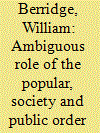

|
|
|
|
|
| Publication |
2013.
|
| Summary/Abstract |
This article addresses a number of obscurities surrounding the role of the various Sudanese police units often referred to as the 'religious police' or 'morality police'. These include the Popular Police, Society Police and Public Order Police. Although these units have often been analysed as agents of 'Arabization', 'Islamization' and the cultural domination of peripheral groups by the hegemonic northern riverain faction within the state, this article focuses instead primarily on the intra-northern debate over these units, which is suggestive of a variety of internal crises the northern government will need to resolve in the wake of secession. It contends that the Sudanese government has never resolved the ambiguity over whether these units function as local crime fighters or as guardians of religious morality. Although a number of analysts argue that the Sudanese regime has become less ideological and thus scaled back the morality police, this ambiguity remains highly relevant today, to the extent that it causes divisions within the security forces and even the government itself. The article further identifies the centrality of the debate over the public order units to the period of self-questioning that has characterized the 'post-Islamist' phase in Sudanese politics. It discusses the ambiguous social status of these units, who have been represented as guardians of urban Sudanese culture by their champions and a threat to it by their detractors.
|
|
|
|
|
|
|
|
|
|
|
|
|
|
|
|
| 10 |
ID:
113397


|
|
|
|
|
| Publication |
2012.
|
| Summary/Abstract |
How can scholars of Sudan now write about the landmass still called "Sudan"? What do we mean when we use the word? How can the name, which denotes a whole, encompass the fragments that make up its official boundaries? For the last several years, events in Sudan have been changing more rapidly than we Sudanists can analyze them or than Sudanese themselves can process them. Now, in its truncated form, delineating national identity-always problematic in the past-becomes far more complex. Considering extant cultural flows of art, language, customs, and religion, the dividing lines are, at best, dubious. A number of events are transpiring at the moment of writing this brief essay that have changed and will continue to change the future of not just one country but now two. For example, nothing is resolved in Darfur (in western Sudan), with peace talks stalled, more violence being perpetrated by the northern central government and its proxies, guerilla groups proliferating and battling among themselves, and a probable link among some Darfur groups and South Sudan forces.
|
|
|
|
|
|
|
|
|
|
|
|
|
|
|
|
| 11 |
ID:
113399
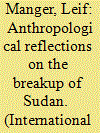

|
|
|
|
|
| Publication |
2012.
|
| Summary/Abstract |
The division of Sudan into two countries on 9 July 2011 following the self-determination referendum of 9 January represents a rare development in Africa. Few examples exist of new state formations in the continent after the end of the colonial period. Answering the call of the IJMES editor to reflect on what this event will mean for our understanding of Sudan might take us in several directions. Let me use this opportunity to comment on two themes that have concerned me lately: the role of the state and the possibility that multiple national identities will evolve in North and South Sudan.
|
|
|
|
|
|
|
|
|
|
|
|
|
|
|
|
| 12 |
ID:
124738
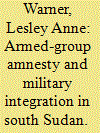

|
|
|
|
|
| Publication |
2013.
|
| Summary/Abstract |
Since the signing of the Comprehensive Peace Agreement in 2005, the government of South Sudan has sought to neutralise the threat that armed groups pose to stability through their integration into the Sudan People's Liberation Army (SPLA), rather than coercion. Although successful in part, this approach has nevertheless led to the continued proliferation of armed groups. In this article, Lesley Anne Warner analyses how the government of South Sudan and the SPLA have administered the amnesty and integration process, concluding that military integration is a process that is managed, but not yet fully mastered.
|
|
|
|
|
|
|
|
|
|
|
|
|
|
|
|
| 13 |
ID:
139991
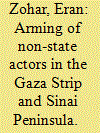

|
|
|
|
|
| Summary/Abstract |
Rebellious non-state actors of the Gaza Strip and the Sinai Peninsula have been arming themselves through smuggling networks operating in north-east Africa and the Middle East. They feature complex, dynamic, open systems which include many components of various organisational and national identities, and which are driven by various motives, united in order to accomplish the goal of arms smuggling. Previously, this system was dominated by the supply of Iranian large and high-quality weapon systems, mainly rockets, to the Palestinian Hamas, enabling them to build up military force that has sustained long-standing conflict against the stronger Israel. The Arab turmoil initiated dramatic changes in the arming system: Iran stopped, at least temporarily, the channelling of weapons to the Hamas due to its support of the Syrian opposition against the Assad regime. Egypt blocked many of Hamas's smuggling tunnels, intensifying Hamas's strategic isolation. Following the removal of Gaddafi and lack of government, Libya became a major arms source, serving mainly regional radical Islamic groups. Salafist jihadist groups in Sinai revolted against the Egyptian government, using huge local stockpiles of weapons and operational cooperation with Palestinian Islamists. This article argues that to survive, rebellious non-state actors must exploit arming opportunities in the physical, social and political environment, whereas securing shared borders is vital for defeating rebellious non-state actors. The arming of non-state actors should be analysed broadly, considering the needs of the civilian population among whom the militants are operating.
|
|
|
|
|
|
|
|
|
|
|
|
|
|
|
|
| 14 |
ID:
027053
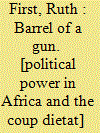

|
|
|
|
|
| Publication |
London, AllentLane Penguin Press, 1970.
|
| Description |
xiii, 513p.hbk
|
| Standard Number |
0713901632
|
|
|
|
|
|
|
|
|
|
|
|
Copies: C:1/I:0,R:0,Q:0
Circulation
| Accession# | Call# | Current Location | Status | Policy | Location |
| 005783 | 960/FIR 005783 | Main | On Shelf | General | |
|
|
|
|
| 15 |
ID:
101766
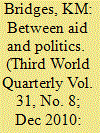

|
|
|
|
|
| Publication |
2010.
|
| Summary/Abstract |
Humanitarian advocacy is emblematic of the relief community's desire to move beyond simply treating the symptoms of suffering, and towards tackling the causes. As such, advocacy is at the front line of debates over where the boundaries between aid and politics should now be drawn and the point where dissension on the subject is most evident. In this paper the challenge that advocacy poses for traditional humanitarian operations in Darfur and the effect of such political engagement on humanitarian identity more generally is assessed. Disagreement among humanitarian organisations is exacerbated by the continued tendency of aid agencies to privilege reaction over reflection. Floundering between unachievable traditional humanitarian principles and the failure of human rights to provide an adequate alternative, humanitarianism is swiftly losing both its identity and its legitimacy. To emerge from the fog of confusion humanitarianism must now take on the professionalism of military science and endeavour to better know both itself and its enemies.
|
|
|
|
|
|
|
|
|
|
|
|
|
|
|
|
| 16 |
ID:
080843
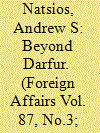

|
|
|
|
|
| Publication |
2008.
|
| Summary/Abstract |
While the crisis in Darfur simmers, the larger problem of Sudan's survival as a state is becoming increasingly urgent. Old tensions between the Arabs of the Nile River valley, who have held power for a century, and marginalized groups on the country's periphery are turning into a national crisis. Engagement with Khartoum may be the only way to avert another civil war in Sudan, and even that may not be enough
|
|
|
|
|
|
|
|
|
|
|
|
|
|
|
|
| 17 |
ID:
151228


|
|
|
|
|
| Summary/Abstract |
This research examines Zartman’s formulation of mutually hurting stalemate and mutually enticing opportunity as variables pushing and pulling parties toward agreement during the negotiation that took place between southern and northern Sudan between 2002 and 2005. This case shows that ripeness theory and formulating the push and pull factors indeed help clarify what brought the parties to negotiate and reach an agreement. However, we contend that the push and pull formulation in its current form might not fully account for the complexity of processes in ethno-political intractable conflicts, such as in Sudan, when the process is characterized by the parties’ mutual distrust and the deep involvement of third parties, driven by their own domestic and foreign policy interests.
|
|
|
|
|
|
|
|
|
|
|
|
|
|
|
|
| 18 |
ID:
104796
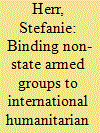

|
|
|
|
|
| Publication |
Frankfurt, Peace Research Insititute Frankfurt (PRIF), 2010.
|
| Description |
38p.
|
| Series |
PRIF report no.95
|
| Standard Number |
9783942532051
|
|
|
|
|
|
|
|
|
|
|
|
Copies: C:1/I:0,R:0,Q:0
Circulation
| Accession# | Call# | Current Location | Status | Policy | Location |
| 056057 | 341.481/HER 056057 | Main | On Shelf | General | |
|
|
|
|
| 19 |
ID:
091050
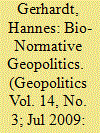

|
|
|
|
|
| Publication |
2009.
|
| Summary/Abstract |
Building on the work of Giorgio Agamben and Michel Foucault, this paper explores the critical intersection between biopolitics and geopolitics. More specifically, an analysis is performed on the discourse that has been produced by the US executive with regard to the ongoing Darfur crisis. I interpret this discourse as part of a bio-normative geopolitical calculation aimed at maintaining the US claim on the valuation of global life without, however, committing many resources to actually protecting and securing this life within a meaningful political community. This investigation points particularly to the challenge that foreign humanitarian crises pose to the legitimacy of the United States' global hegemonic ambitions. I argue that the United States has responded to this challenge by presenting itself as a global moral hegemon whose role is primarily to judge rather than act with regard to the protection of foreign human life. As the named "genocide" in Darfur continues, the United States is also forcing a devaluation of the concept of genocide itself, thus initiating a fundamental recalibration of the relation between global ethics and geopolitics.
|
|
|
|
|
|
|
|
|
|
|
|
|
|
|
|
| 20 |
ID:
104445
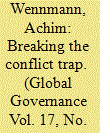

|
|
|
|
|
|
|
|